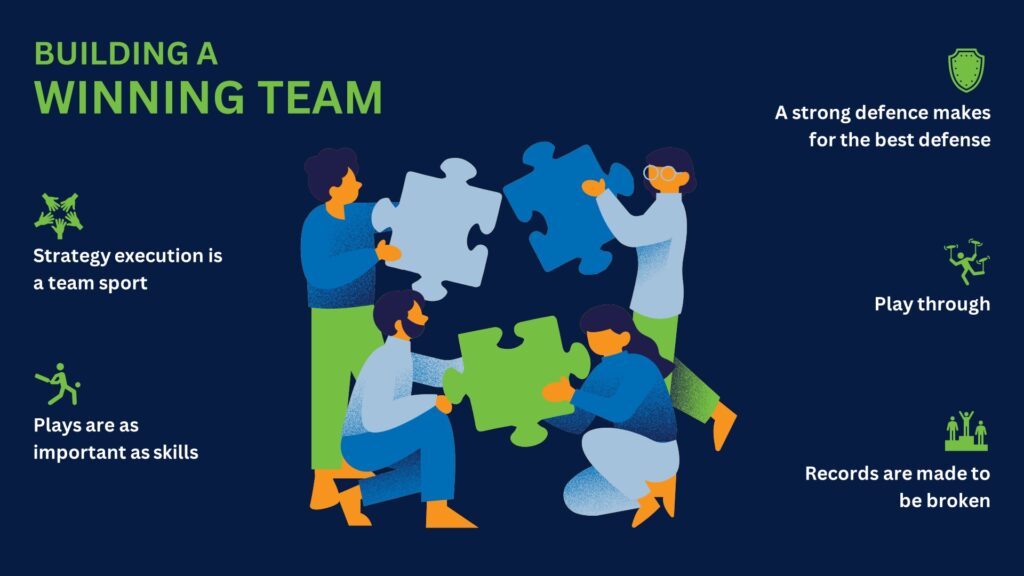At a Glance
- Strategy is essential in both sport and business
- Strategy execution is a team sport
- If personal growth is not balanced, it will cause individuals to get off track and lose focus on their primary goals
Strategy execution is the implementation of real action in an organisation through the strategic management process. Typically, organisations spend a great deal of time and resources on strategy planning, but sometimes, not much of it sees the light of day.
The performance and success of an organisation is determined more by the effective execution of a successful strategy than by a well-defined strategy.
Building a winning team: Observations from sport
Strategy is essential in both sport and business. The competitive nature is similar in both fields, with each game or business endeavour representing a complete cycle. In this light-hearted piece, we look at some of the valuable insights from the world of sports that can help improve strategy execution within an organisation.
1. Strategy execution is a team sport.
A team’s victory depends on the contribution of all team members. In a business context, this implies that everyone in the organisation has a role to play in strategy execution. Teamwork in a business setting allows employees to pool their skills and resources, which can lead to better decisions, and faster problem-solving. No one person is more important than another.
2. Plays are as important as skills.
In sports, plays refer to specific actions that a team takes on the field or court. These actions provide a framework for the team to implement their strategy, but they are not enough. Competencies such as skills, leadership and culture are essential to effective strategy execution and are similar in a business context.
3. A strong defence makes for the best defence.
In sports, a good defence means preventing your opponent from scoring. In business, this adage means that a good defence can prevent your competitors from getting a slice of the pie. This also implies the significance of having a strategy to deal with unforeseen challenges. Businesses need a contingency plan in case circumstances deviate from the planned course.
4. Play through.
Play through is commonly heard in sports. It means persevering and continuing to play even when you are in pain due to injuries. This act shows the player’s determination and grit, and usually leads to victory. In a business context, the phrase “play through” can be applied in a similar way – to continue working hard even when faced with setbacks. For example, a company facing challenges in growing revenue should continue to innovate and grow by “playing through”.
5. Records are made to be broken.
In sports, records are set or broken by athletes who have trained and applied their skills and determination. In a business context, entrepreneurs and innovators who are willing to take risks and think outside the box can also score big, but it also requires a combination of strategic planning, consistent execution, and good timing. This saying “records are made to be broken” applies to both sport and business, reminding us that there is always room for improvement.


Understanding on-the-job coaching for performance breakthrough
Ready for a change in your organisation?
Achieving excellence in business
Based on Orlick’s ‘Wheel of Excellence’ presented in the International Coaching Psychology Review article “Applying sport psychology to business”, this model outlines key skills from the world of sports to the world of business.
The wheel illustrates seven elements linked with excellence that are within the control of an individual. It suggests that equal attention must be given to all seven parts, or the wheel will wobble. In essence, it means that if personal growth is not balanced, it will cause individuals to get off track and lose focus on their primary goals.
- Focus. Some common sports expressions such as ‘keep your eye on the ball’ and ‘stay in the moment’ are applicable in this context. If you lose sight of the process and get caught up in the opinions of others or existing competition, your business is more likely to make mistakes and poor decisions.
- Commitment. What separates high performers from their peers is their commitment to setting ambitious goals and their determination to make the effort and sacrifice to achieve them.
- Mental readiness. Successful athletes have routines they follow before, during, and after an event. These routines include recovery strategies, failure coping mechanisms, and mood management techniques. In a business context, mental readiness refers to identifying the right mindset for a task and finding effective methods to instil that mindset when your business requires it.
- Positive images. Mental imagery affects the physical performance of top performers. In business, it is wise to ‘stay calm and collected’ rather than become defensive when your ideas are rejected at work. In such situations, create the feeling and images of the desired mental state by using the inner dialogue of ‘stay calm and collected’.
- Confidence. High self-confidence is important for athletes. Similarly, in business, it is more useful to focus on what will go right, rather than worrying about what can go wrong. This creates an optimistic outlook.
- Distraction control. This refers to the ability to refocus when things go wrong, so that you can get back on track quickly. In business, you need to recognise when you are being distracted by other unrelated issues. Putting them aside helps you regain control and refocus on the tasks at hand.
- Continuous learning. What happens when athletes feel their performance is not up to par? The key is not to dwell on mistakes but to learn and improve for future performance. Similarly, in business, companies should adopt a culture of continuous improvement to drive operational excellence.
Coaching matters
Drawing parallels from sport to the business context offers inspirational stories and helps normalise the setbacks or obstacles your business may face.
In sports, an athlete can improve the hard way through individual trial-and-error, which can take years to perfect. Engaging an expert coach with a wealth of experience and knowledge can enhance athletes’ sport performance.
In business, it can be hard and painful to identify gaps or mistakes that are holding your business back. Getting help from an external partner like Renoir can benefit your business, as we bring a wealth of knowledge and experience from our past projects and experiences that your business may be lacking.
Renoir Consulting provides the necessary guidance, resources, and expertise to address the challenges you face on your journey to operational excellence. We provide a structured approach to deliver sustainable and impactful outcomes, enabling your organisation to achieve operational efficiency, and drive successful transformation across the organisation.
Put me in touch with an expert who can help me transform my business.
Sources:
1. Rani, P. Strategic Implementation in Organisations: A Conceptual Overview. Management Volume 14, Issue 3. Published in September 2019.
2. Levlela, L. & Terry, P. C. Applying sport psychology to business. International Coaching Psychology Review, Vol 3, No 1. Published in March 2008.













